This post may contain affiliate links. Please read our disclosure policy.
Za’atar Swirl Bread showcases the fabulous flavor of za’atar in a delicate bread enriched with eggs and olive oil. The method to the glorious twisted loaves is straightforward and very doable!
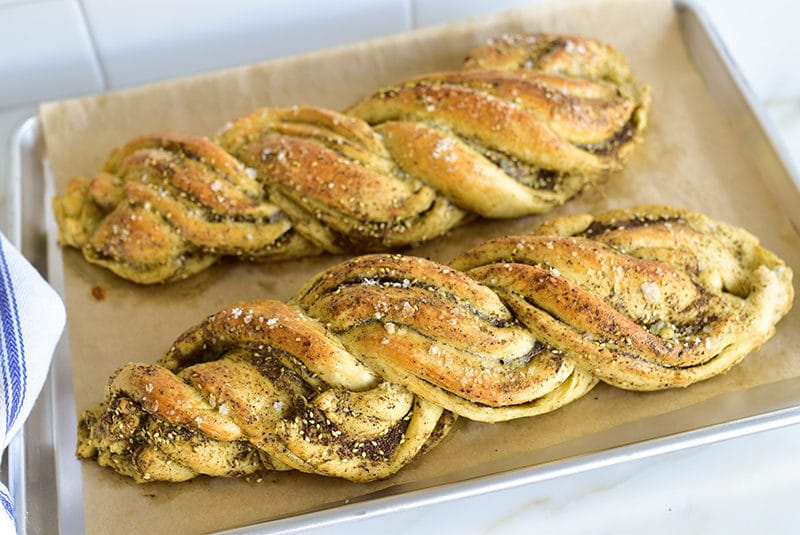
Dan, upon tasting za’atar swirl bread:
This bread has it ALL.
(chews a big bite)
This bread has flavor. I can taste the za’atar. I can crunch the salt.
(another big bite)
The bread has texture. It’s so soft. Yet substantial. With a crisp exterior.
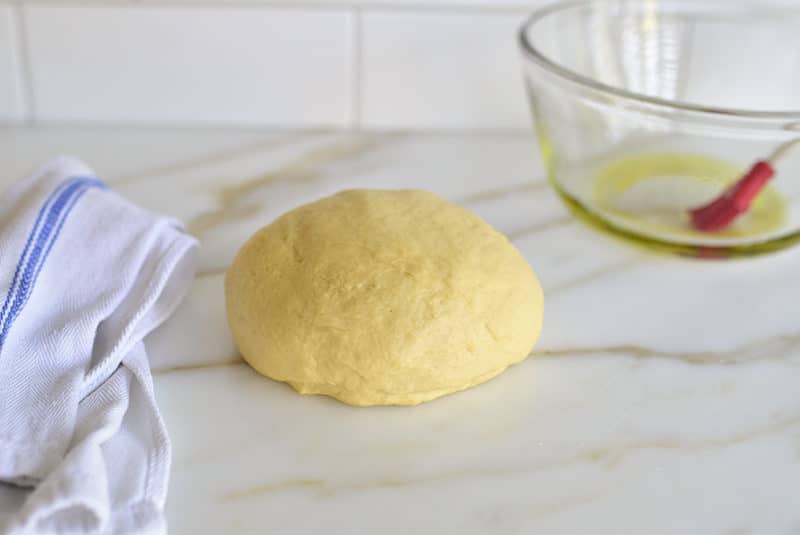
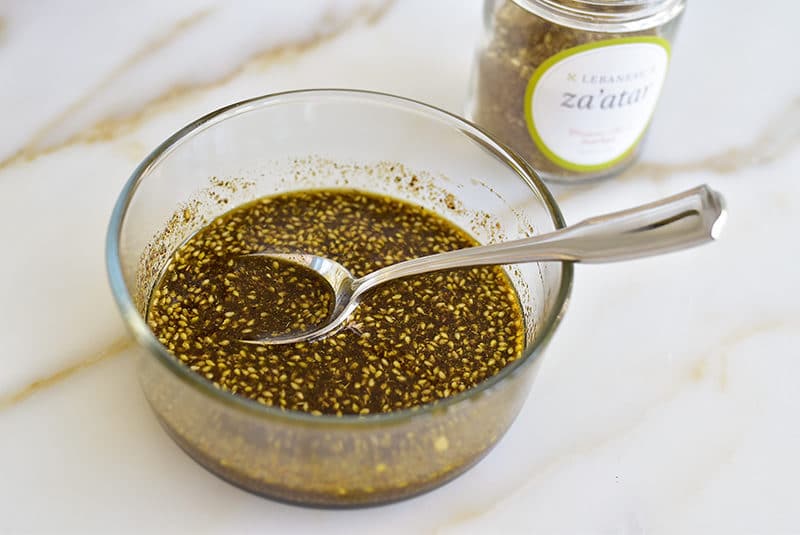
Maureen, upon hearing his remarks (and seeing them: he stood in the kitchen with his hands speaking with the words):
Well that makes my day!
Dan:
Your day? Makes my day more.
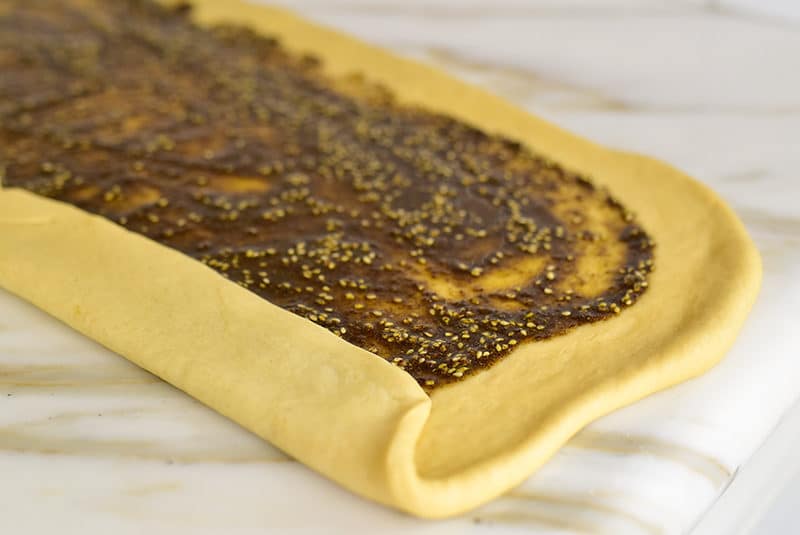
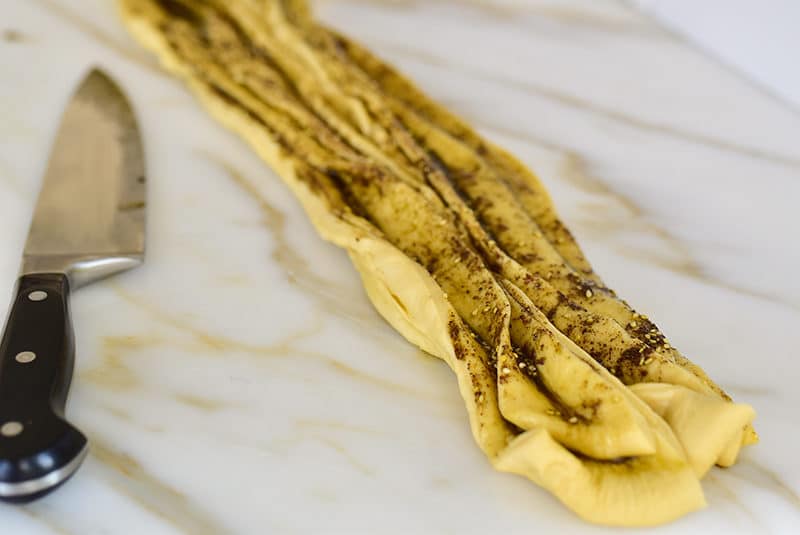
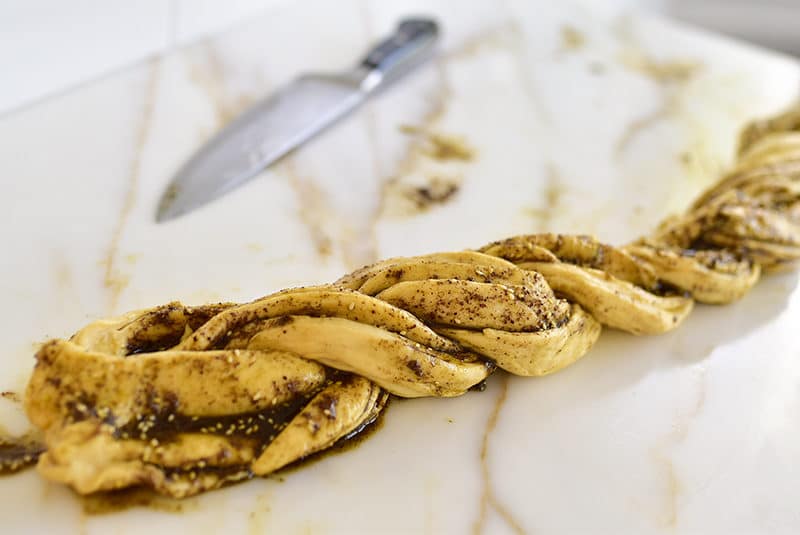
So. If you want a beautiful bread that has it ALL, here you go.
Za’atar, the Lebanese spice blend of wild thyme, sumac, and sesame seeds (pronounced ZAH-tuh; find a great one here), is mixed with oil, then spread on enriched dough (oil, eggs).
The dough is rolled up with the za’atar filling, then cut along its tremendous length, then twisted and split in half to form two gorgeous loaves (don’t worry, there’s ample instruction on how-to–and you sure can). I looked to my Christmas Breakfast Wreath bread as a starting point, but no wreath, and no sweet.
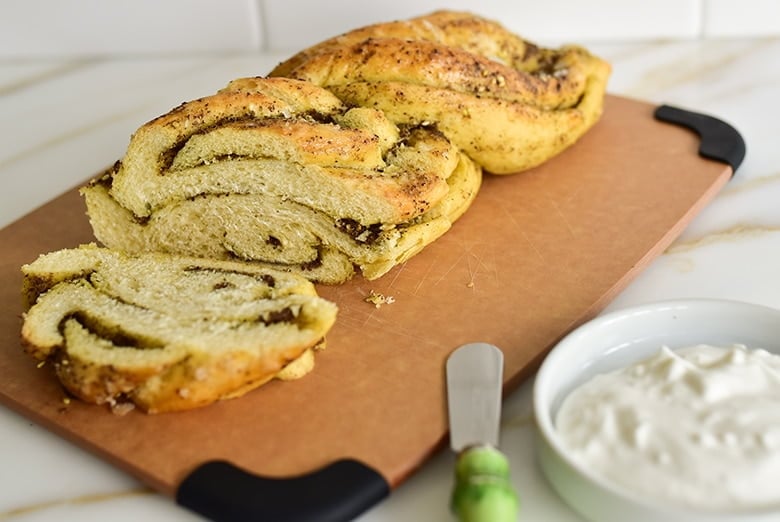
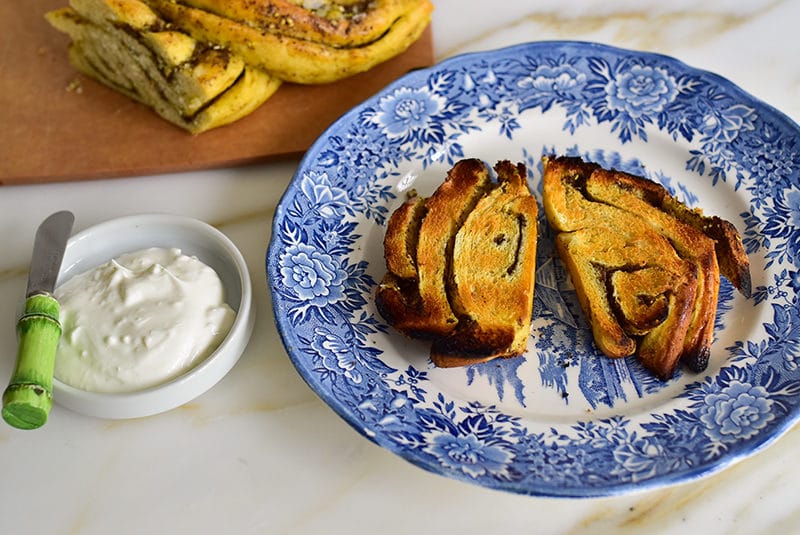
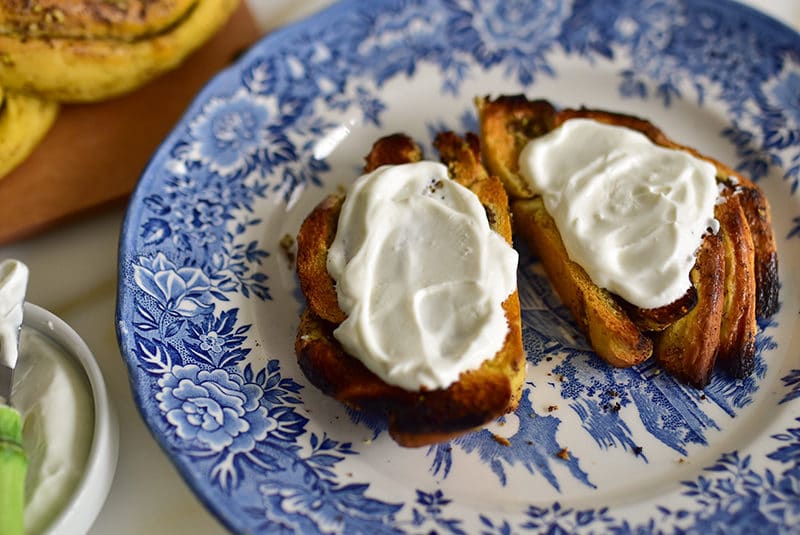
The final egg wash is for browning but also to adhere crunchy flakes of sea salt to the top, for even more flavor and texture.
Za’atar Twist Bread slices will dunk happily into all of the warm soups and stews to come in the months ahead.
Thick slices also toast to perfection for breakfast, where za’atar is very much at home. Slather with labneh. Day is made.

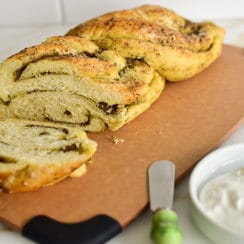
Za’atar Swirl Bread
Ingredients
For the dough:
- 1 packet active dry yeast, or 2 1/4 teaspoons
- 3/4 cup warm water, about 105 degrees
- 1 tablespoon granulated sugar
- 2 large eggs, room temperature
- 1/4 cup extra virgin olive oil
- 3 1/2 cups unbleached, all-purpose flour
- 2 teaspoons kosher salt
For the filling:
- 3 tablespoons za'atar
- 1/2 cup extra virgin olive oil
For the egg wash + finishing:
- 1 large egg, beaten
- 2 teaspoons flaky sea salt, such as Wajd or Maldon
Instructions
- In a large mixing bowl (in a stand mixer or by hand), dissolve the yeast and sugar in the water until it is creamy and foaming, about 10 minutes. Blend in the olive and eggs with a spoon or the hook attachment in the stand mixer. Mix in two cups of the flour, one cup at a time, along with the 2 teaspoons salt. Beat or work with your hands for 2 minutes. Slowly add the remaining flour ½ cup at a time until you have a soft dough that is only
slightly sticky. - Knead the dough until smooth on a lightly floured work surface and knead, adding flour to keep the dough from sticking, 5 to 10 minutes. Even if you’re using the stand mixer to start, do this by hand to enjoy the full experience of this wonderful dough. Place in a clean large, lightly oiled mixing bowl. Cover with plastic wrap and let it rise in a warm place until doubled in bulk, about 90 minutes.
- In a small bowl, stir the za'atar and olive oil.
- When dough has doubled in size, turn it out onto a large, lightly floured work surface. Taking control of the dough and using a measuring tape, roll the dough into a 9×30-inch rectangle. Spoon the za'atar filling over the dough and spread to about an inch around the perimeter, leaving that perimeter clean.
- Starting along a long side, tightly roll up the dough, pinching the edge against loaf to seal it. With a sharp knife, cut the roll in half lengthwise. Gently turn the halves so the cut sides are facing up, and then loosely twist the halves around each other, keeping the cut sides up. Pinch the center of the long twist to separate the twist into two even lengths. Pinch all of the ends of the loaves to hold the twists together.
- Line a baking sheet with parchment or non-stick baking mat. Carefully transfer the ropes to the baking sheet by picking up portions and moving them gently a bit at a time. Leave as much space as possible between the loaves. Brush the tops of the loaves with the beaten egg. Let them rise again, lightly covered, in a warm place until puffy, about 45 minutes.
- Preheat the oven to 350°F. Brush the loaves again with the egg wash, and this time sprinkle the tops evenly with the sea salt. Bake the loaves until they are light golden brown in spots, about 25 minutes.
- Cut into slices and serve warm.
Nutrition information is automatically calculated, so should only be used as an approximation.

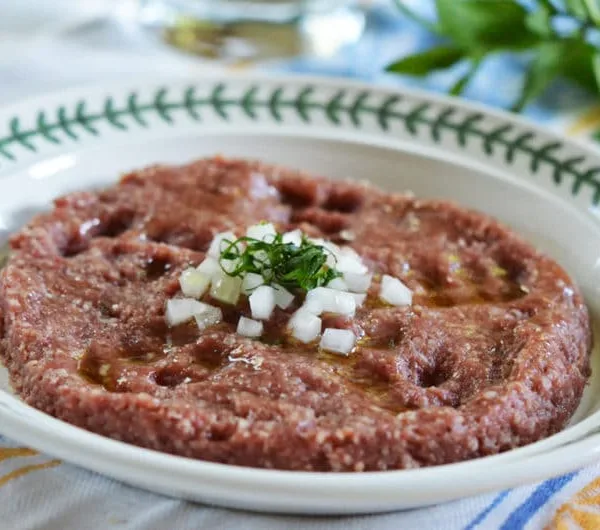
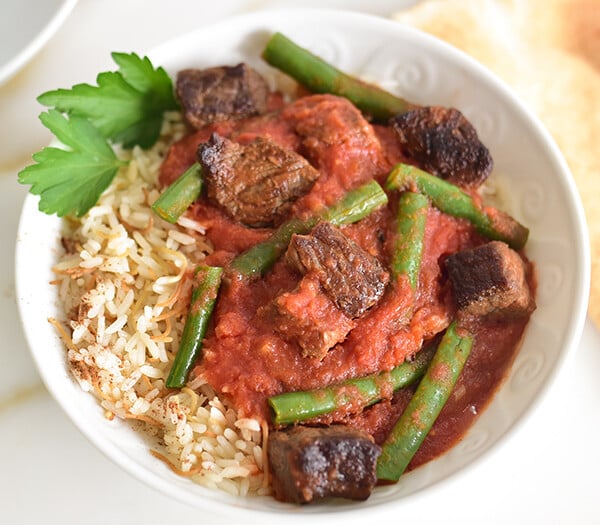
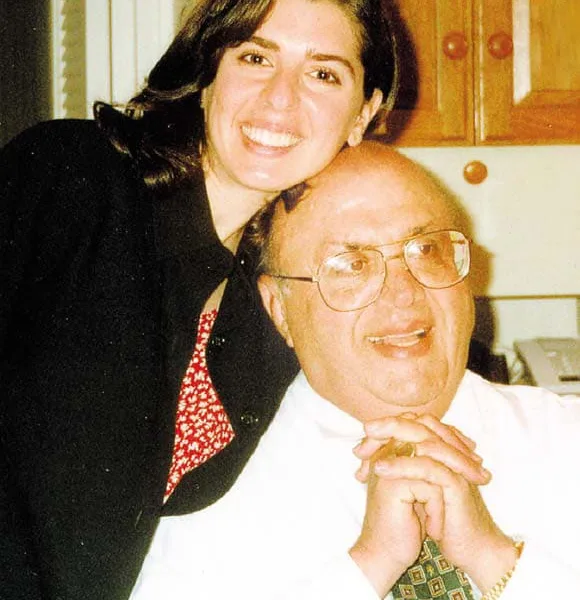







I make my dough a little different. Just use self rising flour & buttermilk.
Then I make my rounds. Cove them with zartar mixed with olive oil . Bake
Vivian that sounds wonderful, traditional za’atar flatbread. I bet your use of buttermilk gives the bread great flavor and texture!
Is this something you could freeze in the dough stage, before the second rise (either filled or unfilled)? I’ve done this with your talami loaf with great success, but since not all doughs react well to freezing I thought I’d see if you have tried this before…
Michelle that ought to work just fine. I’m glad to hear you’ve frozen talami dough after the first rise sucessfully!
One trick I adapted from a similarly twisted chocolate babka: For the egg wash I reserve the yolk of a separated egg. With the egg white, I whisk it together with the fat (in this case olive oil, for babka it’s tempered chocolate) to form a spreadable consistency (essentially a mayonaisse) then I mix the za’atar into that so that when twisting the braid, the oils don’t leak out quite as badly.
Great idea, thank you!!
Great recipe! I’m Lebanese so Za’atar is a staple for me! It was a nice twist on the regular manaaiche (the classic Za’atar pizza)! I personally put a little less oil (about 1/3 to 1/2 less – I eyeballed it) to the Za’atar mix and it worked perfectly ! Will definitely make again 🙂
Great comment and tip Mona, thank you!
My daughter has a dear friend from Jordan who was supposed to be a bridesmaid in her upcoming wedding. Since she is unable to travel here, I wanted to make something to represent her friend. We are having a backyard wedding and ceremony. I thought of making this bread for the communion service. Is this something that could be make ahead and frozen? There will be so much to do on the days before, yet we do want to honor our daughter’s dear friend.
Hello–how lovely. You could make this bread in advance; be sure to freeze the bread, well-wrapped, the day you bake it so it retains freshness.
I love your recipes. I made this gluten free subbing in Cup4Cup and it came out great. Best dough I’ve worked with in 10 years of gluten free baking.
This is such a great tip, thank you Colleen!
I’d love you to do a video to see how you make the twists.
Merry Christmas to all.
Thank you! I’d love to make this video. Stay tuned.
This was terrific! We halved the recipe to make one loaf. After reading the comments, we started with reduced oil but ended up using the amount in the recipe (halved, of course!) A little oil spillage, but not a lot. We did spread the paste to within 1 inch of the parameter. Absolutely delicious – we regret we just made one loaf. We also made the mujadara and loved that too. Both are keeper recipes – off to buy the book!
Iris, wonderful, thank you!
Hi, Maureen… I made this for the first time yesterday and it was fantastic! The bread had a nice softness and chew, and the zaatar and salt were the perfect seasonings. Like a commenter above, I also felt that there was too much oil in the filling. My filling did not look as pasty as yours, despite my precise measurements, and as I rolled and twisted, I lost much of the oil and spices to the counter. Next time I think I’ll put the 3 tbsp zaatar in a bowl and add enough olive oil to make a soft, spreadable paste. Also, after rolling out the 9 x 30 rectangle, I think next time I’ll cut the dough in half at that point and the spread the paste within 1-inch of the borders of both pieces. It’s easier to pinch closed the ends if oily filling is not spilling out. This is definitely a keeper recipe and I’m looking forward to enjoy a few more slices of this today!
Tony, thank you for reporting back! Cutting the dough in half to make it more manageable is a terrific idea. I’ll have to revisit my ratio on the za’atar mix and update the recipe based on this great input.
Oh my. The dough was easy to work with, but the filling went everywhere! 1/2 cup olive oil was way too much. The filling seeped out everywhere. If I try this again, I’ll brush the oil on the dough and sprinkle zaatar on top of that. The bread is rising now and I hope it is worth it. I love Za’atar pie, so I had high hopes for this bread.
Oh Amanda, that’s not good! We love this bread and I try to get as much oil+za’atar in the filling as possible.
I made this, and the recipe worked perfectly. My guests enjoyed it with their hummus and baba ganoush.
But I have a suggestions for the method. Instead of trying to roll up something 30″ long, I cut the dough after spreading the za’atar filling, so I was working with a sheet that measured 9″ by 15″. Same result . . . just easier to handle.
If you can, post the internal temperature that you think the bread should be baked to.
Thank you for the smart tip, Judith!
This looks heavenly and I can’t wait to make this tasty bread. There is nothing better than bread, za’atar and labneh for breakfast!.
Amen to that!